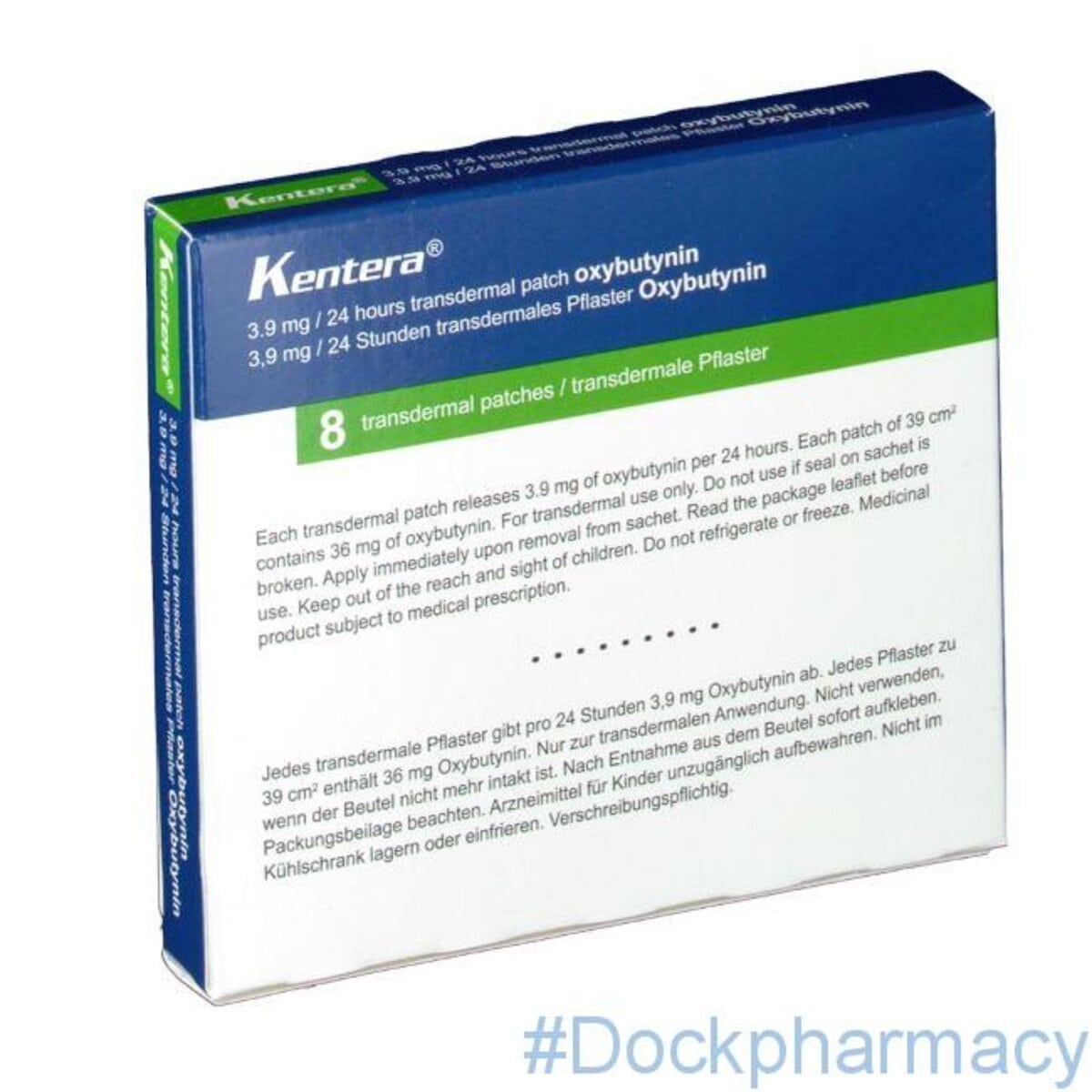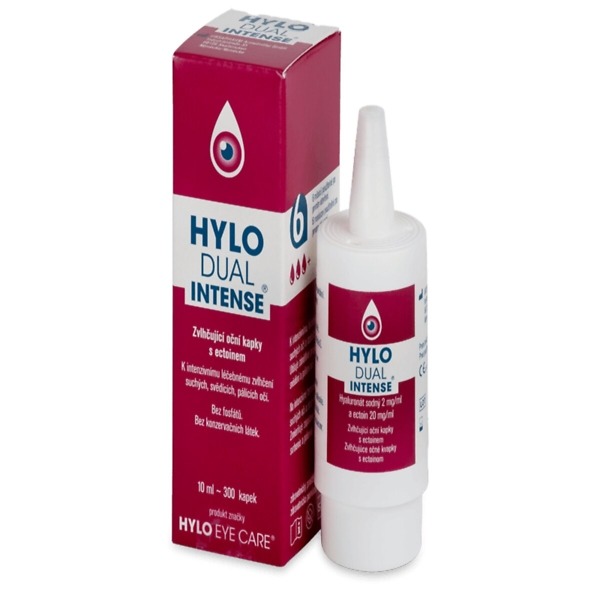Kentera Oxybutynin PATCH, 8 Patches
Kentera (Oxybutynin) PATCH, 8 Patches
WHAT KENTERA IS AND WHAT IT IS USED FOR
Kentera is used in adults to control the symptoms of urge incontinence and/or increased urinary frequency and urgency.
Kentera Oxybutynin patch works by allowing the bladder to expand and accommodate more urine.
£43.68
CompareCompareKentera (Oxybutynin) PATCH, 8 Patches
WHAT KENTERA IS AND WHAT IT IS USED FOR
Kentera is used in adults to control the symptoms of urge incontinence and/or increased urinary frequency and urgency.Kentera Oxybutynin patch works by allowing the bladder to expand and accommodate more urine.Patient Information LeafletKentera Oxybutynin PATCH, 8 Patches
Kentera Oxybutynin patch is used for the symptomatic treatment of urge incontinence and/or increased urinary frequency and urgency as may occur in adult patients with unstable bladder.
Brand
Kentera
How to use
How to use Kentera Patches
Apply a new Kentera patch twice weekly (every 3 to 4 days) according to the instructions for use. Change the patch on the same two days every week, for example, every Sunday and Wednesday or Monday and Thursday
Warning
Do not use Kentera:
- If you are hypersensitive (allergic) to oxybutynin or any of the ingredients of Kentera.
- If you have a rare condition called myasthenia gravis that makes the muscles in the body become weak and tire easily.
- If you experience incomplete bladder emptying during urination, the use of oxybutynin may increase this problem. You should discuss this problem with your doctor before using Kentera.
- If you have digestion problems caused by reduced emptying of the stomach after a meal you should consult your doctor before using Kentera.
- If you have glaucoma or a family history of glaucoma, tell your doctor.
Take special care with Kentera:
If you have any of the following:
- Liver problems
- Kidney problems
- Difficulty urinating
- Intestinal blockage
- Bloody stools
- Generalized muscle weakness
- Painful swallowing
Since treatment with oxybutynin may cause decreased perspiration, there is an increased risk of fever and heat stroke if you are exposed to high environmental temperatures.
Kentera is not recommended for use in children or adolescents.
Taking other medicines
Please tell your doctor or pharmacist if you are taking or have recently taken any other medicines, including medicines obtained without a prescription.
Applying the Kentera patch at the same time as taking other medicines that have similar side effects such as dry mouth, constipation and drowsiness, may increase how often and how severe these side effects are experienced.
Oxybutynin may slow the digestive tract and thereby influence the adsorption of other oral medicines, or the use of this medicine together with other medicines may increase the effect of oxybutynin. Especially:
- Ketoconasole, itraconazole or fluconazole (used for the treatment of fungal infections).
- Erythromycin a macrolide antibiotic (used to treat bacterial infections).
- Biperiden, levodopa, or amantadine (used to treat Parkinson’s disease).
- Antihistamines (used in the treatment of allergies such as hayfever).
- Phenothiazines or clozapine (used to treat mental illness).
- Tricyclic antidepressants (used to treat depression).
- Dipyridamole (used to treat blood clotting problems).
- Atropine and other anticholinergic medicines (used for treatment in stomach disorders such as irritable bowel syndrome).
Using Kentera with food and drink
Oxybutynin may cause drowsiness or blurred vision. Drowsiness may be increased by consumption of alcohol.
Pregnancy and breast-feeding
Ask your doctor for advice before taking any medicine.
Kentera should not be used during pregnancy unless clearly necessary.
When oxybutynin is used during breast-feeding, a small amount is excreted in the mother’s milk. Use of oxybutynin while breast-feeding is therefore not recommended.
Driving and using machines
Because Kentera may produce drowsiness, somnolence, or blurred vision, patients should be advised to exercise caution when driving or using machinery.
Side Effects
POSSIBLE SIDE EFFECTS of Kentera Patch
Like all medicines, Kentera can cause side effects, although not everybody gets them.
The frequency of possible side effects listed below is defined using the following convention:
- Very common (affects more than 1 user in 10)
- Common (affects 1 to 10 users in 100)
- Uncommon (affects 1 to 10 users in 1,000)
- Rare (affects 1 to 10 users in 10,000)
- Very rare (affects less than 1 user in 10,000)
- Not known (frequency cannot be estimated from the available data)
Very common side effect:
- itching around the site of patch application
Common side effects:
- redness or rash at the site of patch application
- dry mouth
- constipation
- diarrhoea
- upset stomach
- stomach pain
- headache or sleepiness
- urinary tract infections
- blurred vision
- dizziness
Uncommon side effects:
- upper respiratory tract or fungal infections
- palpitations
- hot flushes
- back pain
- urinary retention
- difficulty urinating
- common cold
- accidental injury
If any of the side effects get serious, or if you notice any side effects not listed in the leaflet, please tell your doctor.
Ingredient
Ingredient
Kentera 3.9 mg / 24 hours transdermal patch
Oxybutynin
There are no answers to this question, be the first to respond.
Other Products From This Seller
Alcohol Swabs – Pre-Injection Swabs, 100 Sterile Isopropyl Alcohol 70% Swabs Ensure optimal hygiene with Alcohol Swabs – Pre-Injection Swabs, 100 (Aero Wipes). These sterile pre-injection swabs are infused with 70% isopropyl alcohol, providing effective disinfection for skin preparation before injections or minor medical procedures. Designed for healthcare professionals and home use, Aero Wipes offer […]
Learn More£1.69
- Availability: in stock
Original price was: £22.40.£20.89Current price is: £20.89.
COLEDOSE D3 4000IU TABLETS
Learn MoreOriginal price was: £22.40.£20.89Current price is: £20.89.
- Availability: in stock
Dydrogesterone 10mg Tablets, 28 Tablets Dydrogesterone also known as Duphaston
Learn More£130.00
- Availability: in stock
Sucralfate Suspension 1g/5ml, 200ml Effective Ulcer Treatment and Stomach Protection Sucralfate Suspension 1g/5ml is a highly effective treatment for stomach ulcers and inflammation, offering targeted relief and protection from further irritation caused by stomach acid. This suspension works by forming a protective barrier over ulcers, allowing them to heal and preventing further damage. Ideal for […]
Learn More£291.20
- Availability: in stock
Fostimon 75IU Injections – Urofollitropin, 10 Vials Promoting Ovulation for Fertility Treatment Fostimon 75IU Injections are specially formulated to aid ovulation in women who are experiencing difficulties conceiving due to a lack of ovulation or have not responded to other fertility treatments, such as clomifene citrate. Fostimon contains Urofollitropin, a highly purified form of human […]
Learn More£448.50
- Availability: in stock
Tolak Cream – Fluorouracil 40mg/g cream, 20g Effective Treatment for Actinic Keratosis (Sun-Damaged Skin) Tackle sun-damaged skin effectively with Tolak Cream (Fluorouracil 40mg/g), specially formulated to treat actinic keratosis (AK) on the face, ears, and scalp in adults. Tolak works by destroying pre-cancerous and cancerous cells on the skin, promoting healing while minimizing damage to […]
Learn More£39.00
- Availability: in stock
Chlorambucil 2mg Tablets, 25 Tablets Target Cancer Effectively with Chlorambucil 2mg Tablets – For Human and Veterinary Use Chlorambucil 2mg Tablets are a potent chemotherapy medication used to treat various types of cancers, including chronic lymphocytic leukemia, Hodgkin’s lymphoma, and non-Hodgkin’s lymphoma. This medication works by inhibiting the growth and spread of cancer cells, making […]
Learn More£28.50
- Availability: in stock
Nutrizym 22 Capsules – Amylase Lipase Digestive Enzymes, 100 Capsules Experience the transformative health benefits with Nutrizym 22 Capsules, your go-to solution for optimal digestive health. Each capsule is expertly formulated with a powerful blend of amylase and lipase enzymes, designed to effectively break down fats, carbohydrates, and proteins in your diet. Perfect for individuals […]
Learn More£49.95
- Availability: out of stock














